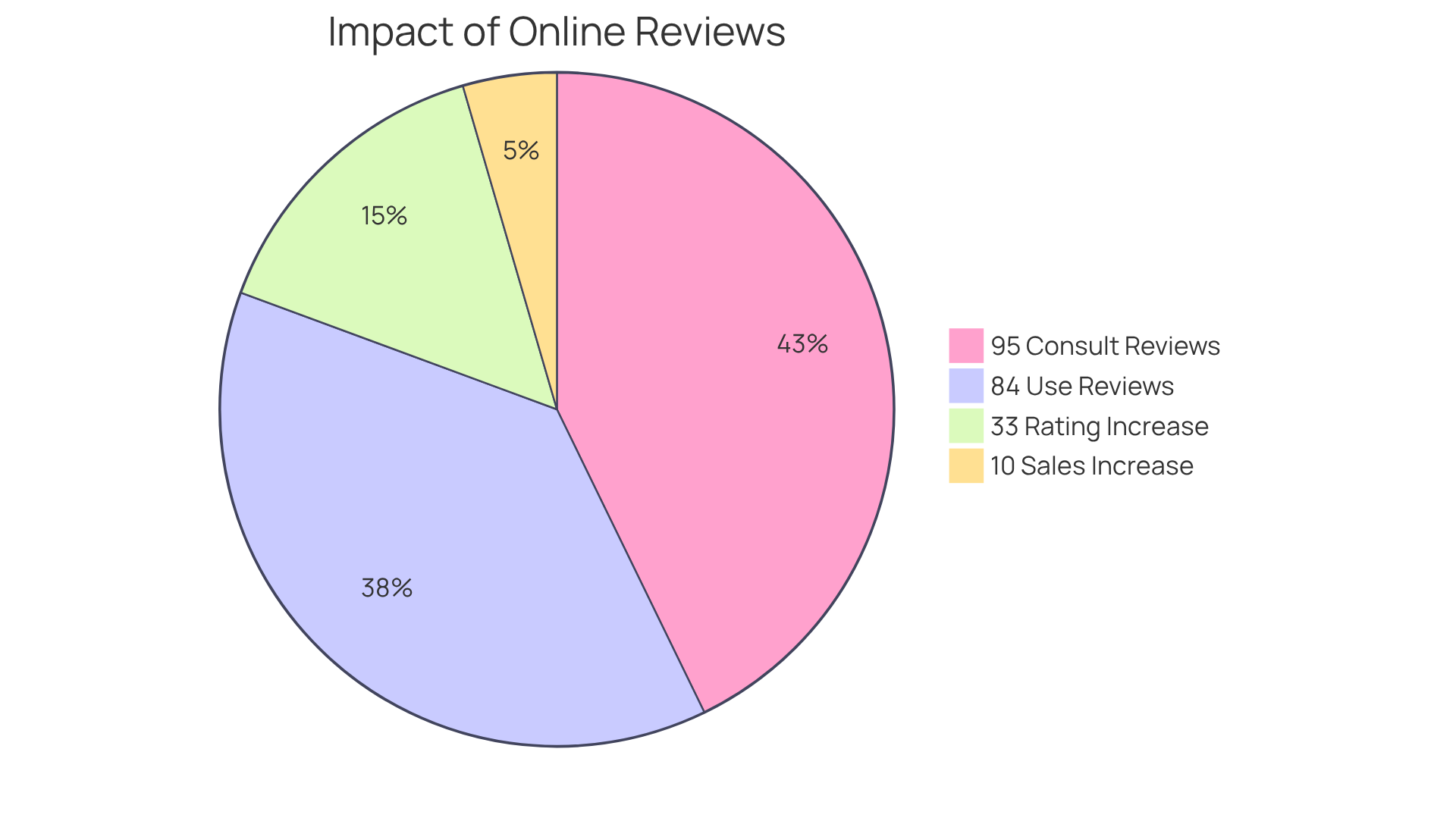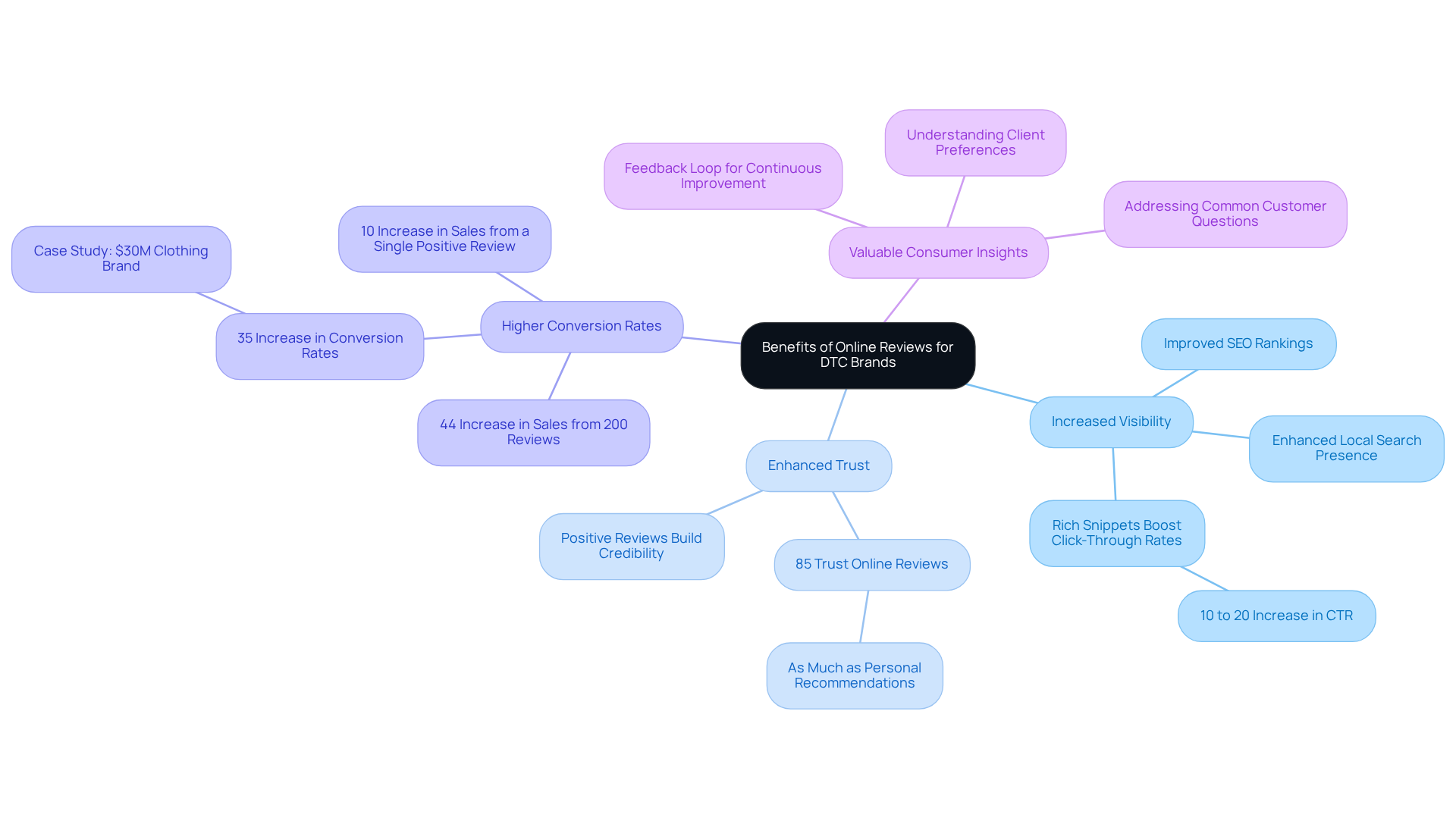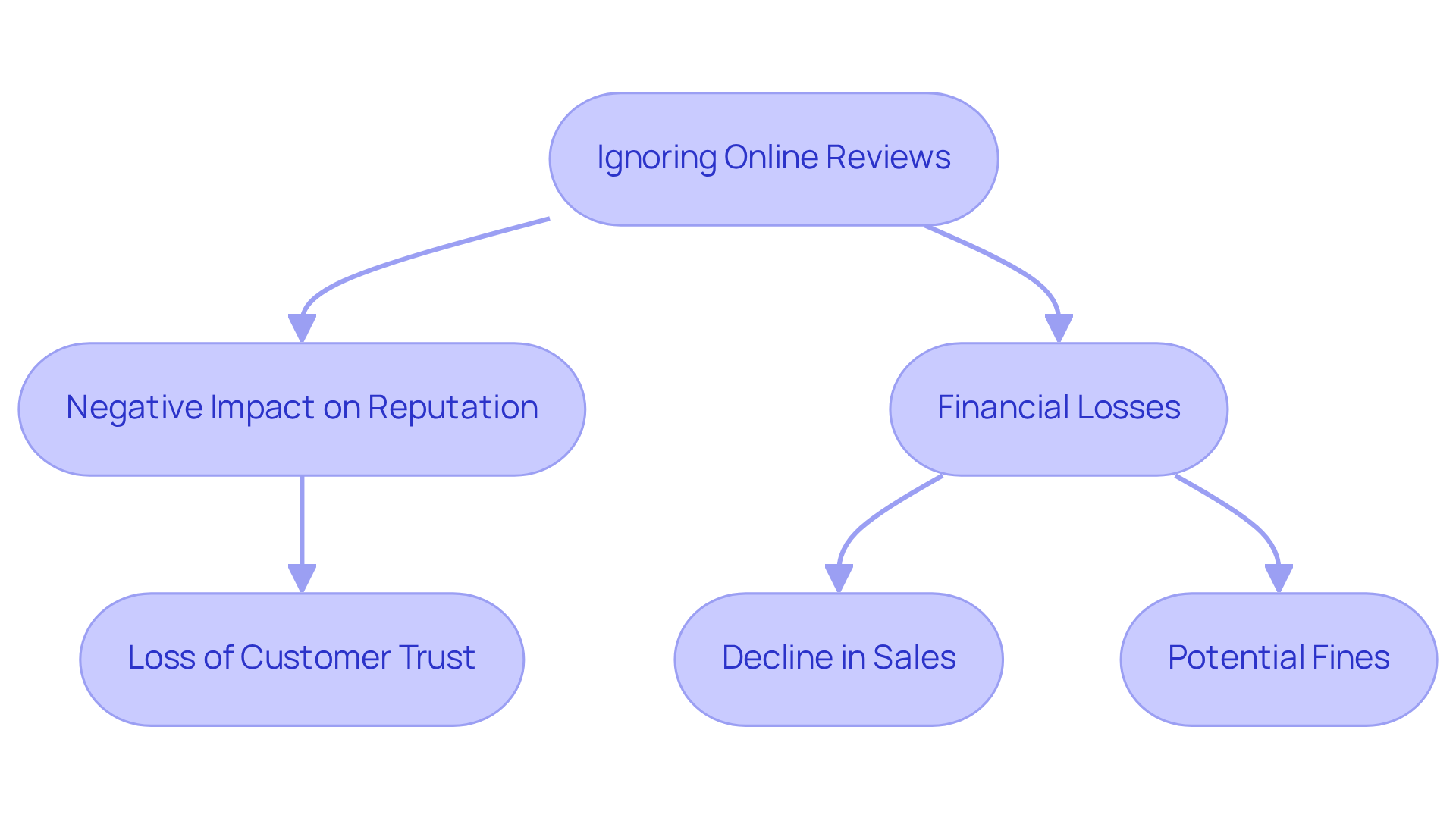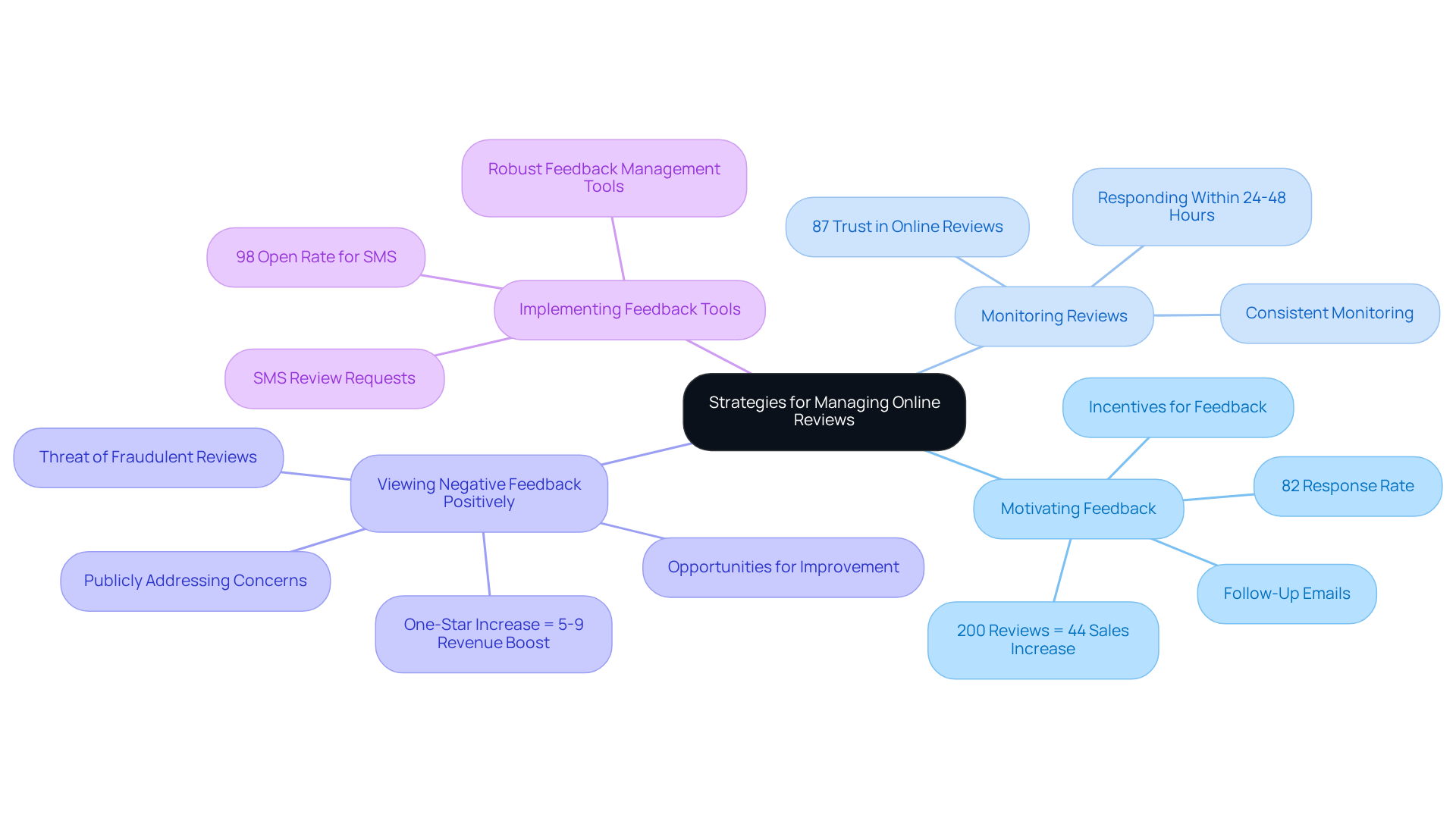
Overview
Online reviews are indispensable for the success of direct-to-consumer (DTC) brands, as they profoundly influence consumer trust and purchasing decisions. In fact, 95% of shoppers consult online reviews before making a purchase. Positive reviews not only enhance brand credibility but also drive sales. Furthermore, effective management of online feedback can lead to significant revenue growth and foster customer loyalty. Therefore, it is crucial for DTC companies to prioritize their online reputation, ensuring they harness the full potential of consumer feedback to bolster their market position.
Introduction
Online reviews have emerged as a pivotal element in the success of direct-to-consumer (DTC) brands, significantly shaping consumer perceptions and influencing purchasing decisions. With nearly all shoppers consulting these evaluations prior to making a purchase, the stakes for managing online reputation have never been higher. This article explores the profound impact of online reviews on brand credibility, sales, and customer loyalty, while also addressing the potential pitfalls of neglecting consumer feedback.
How can DTC brands effectively harness the power of online reviews to enhance their visibility and build lasting trust with their audience?
Influence of Online Reviews on Consumer Behavior
Online reviews play a crucial role in shaping consumer behavior, particularly within the direct-to-consumer (DTC) sector. Research indicates that approximately 95% of shoppers consult online reviews before making a purchase, highlighting their significance as a form of social proof. Potential buyers frequently depend on the experiences of others to gauge the reliability and quality of products or services.
Positive evaluations in online reviews enhance a company's credibility and foster consumer trust, while negative online reviews can dissuade potential clients from completing a purchase. The psychological principle of social validation suggests that consumers are more inclined to trust products that have received favorable online reviews from their peers, which leads to increased conversion rates for brands that adeptly manage their digital reputation.
Studies demonstrate that a single positive online review can lead to a 10% increase in sales, illustrating the direct influence of consumer feedback on purchasing behavior. Furthermore, with 84% of buyers utilizing online reviews on digital evaluation platforms during their decision-making process, the importance of cultivating a strong online presence cannot be overstated.
Brands that prioritize collecting and addressing feedback are better equipped to build consumer trust and drive sales. Parah Group's innovative Conversion Rate Optimization (CRO) strategies focus on enhancing online reviews and addressing negative comments, ensuring that brands can effectively manage their reputation.
Businesses that respond to unfavorable feedback within 24 hours see a 33% increase in the likelihood of consumers improving their ratings. Additionally, addressing the issue of fraudulent evaluations is crucial, as 67% of consumers perceive such assessments as problematic.
In conclusion, developing a robust strategy for online reviews is imperative for DTC companies that aim to increase sales and cultivate consumer trust.

Benefits of Online Reviews for DTC Brands
Online evaluations are indispensable for DTC companies, offering a multitude of benefits that are vital for effective marketing strategies. Favorable feedback can substantially elevate a company's visibility on search engines, leading to improved SEO rankings and increased organic traffic. In a fiercely competitive DTC landscape, where companies strive for consumer attention, this visibility is paramount. Furthermore, trust and credibility are significantly bolstered through feedback; research indicates that approximately 85% of consumers place as much trust in online reviews as they do in personal recommendations. This trust translates into higher conversion rates, as consumers are more likely to purchase from companies with positive feedback.
For instance, a $30M clothing brand that partnered with Parah Group witnessed a remarkable 35% increase in conversion rates after implementing strategies such as:
- Redesigning their homepage to highlight social validation and customer feedback
- Reducing unnecessary pop-ups
- Optimizing product pricing
This case exemplifies how effectively leveraging online reviews can result in substantial revenue growth. Additionally, evaluations serve as a crucial source of insight into client preferences and challenges. Brands that actively solicit and engage with feedback can create a cycle that not only enhances customer satisfaction but also fosters repeat purchases and brand loyalty. A single positive review can generate a 10% increase in sales, while accumulating 200 reviews can elevate sales by as much as 44%. Moreover, client feedback enhances visibility in local and niche searches, optimizing search expenditures. By adeptly utilizing consumer insights, DTC companies can refine their offerings and strengthen their market position.
In conclusion, online reviews not only enhance visibility and foster trust but also provide invaluable insights that can drive sales and cultivate customer loyalty, establishing them as a fundamental component of any DTC company's marketing strategy.

Consequences of Ignoring Online Reviews
Ignoring digital assessments can lead to dire consequences for direct-to-consumer companies, resulting in substantial financial losses and damage to their reputation. Research indicates that 94% of customers actively avoid companies with negative online reviews, highlighting the urgent need for organizations to engage with their audience and effectively manage their online reviews. A lack of an active review management strategy can create a cycle of poor performance; companies that overlook client feedback risk alienating potential buyers, as negative comments can quickly proliferate across social media and review platforms.
For example, businesses that fail to respond to negative reviews may experience a decline in sales, as potential clients are deterred by the perceived lack of engagement. Conversely, those that proactively manage their online reviews can transform negative experiences into opportunities for growth, showcasing their commitment to customer satisfaction. This is where Parah Group's expertise in Conversion Rate Optimization (CRO) proves invaluable. By focusing on sustainable profitability and growth, Parah Group aids DTC brands in implementing effective feedback management strategies that enhance customer engagement and increase conversions, ultimately reducing client acquisition costs.
The financial implications are significant; companies can suffer losses amounting to 59.2% of potential clients if they have more than three negative articles in search results. Additionally, under the FTC's new regulations, businesses face potential fines of up to $51,744 for misleading practices related to reviews. Thus, establishing a robust feedback management strategy that leverages online reviews is not merely beneficial but essential for sustaining profitability and fostering long-term customer loyalty.

Strategies for Managing Online Reviews
To effectively handle online reviews, DTC brands must adopt a proactive approach that includes several key strategies.
-
Motivating satisfied clients to share positive feedback is crucial. This can be accomplished through follow-up emails and thoughtful incentives, which have been proven to significantly enhance participation rates. Indeed, research indicates that 82% of customers respond favorably when requested for feedback shortly after their purchase. Furthermore, accumulating 200 evaluations can lead to a 44% increase in sales, underscoring the financial impact of effective feedback management.
-
Consistent monitoring of review platforms is vital. By staying attuned to client feedback, companies can respond swiftly to both positive and negative comments, demonstrating a commitment to customer satisfaction and fostering loyalty. A timely response can bolster a company's credibility, as 87% of consumers trust online reviews as much as they trust personal recommendations. It is imperative to respond to feedback within 24-48 hours to maintain client trust and satisfaction.
-
Companies should view negative feedback found in online reviews as opportunities for improvement. Addressing customer concerns publicly not only enhances credibility but also signals to potential buyers that the company values feedback, including online reviews, and is dedicated to making necessary adjustments. For instance, a one-star increase in a business's Yelp rating can result in a 5-9% boost in revenue, highlighting the financial ramifications of effective feedback management. Additionally, the potential threat of fraudulent reviews should not be overlooked, as they can severely damage a company's reputation.
-
Implementing a robust feedback management tool can streamline the process. Such tools enable companies to monitor feedback across various platforms and assess consumer sentiment efficiently. SMS has proven to be an effective channel for collecting reviews, boasting a 98% open rate, making it a reliable method for soliciting feedback.
By employing these strategies, DTC brands can cultivate a positive online reputation that drives growth and enhances customer trust, ultimately leading to increased sales and customer loyalty.

Conclusion
Online reviews are a cornerstone for the success of direct-to-consumer (DTC) brands, profoundly influencing consumer behavior and shaping purchasing decisions. The overwhelming reliance on peer feedback as a form of social proof underscores the necessity for brands to actively engage with and manage their online reputation. Companies that harness the power of positive reviews not only enhance their credibility but also significantly boost their sales and customer loyalty.
Throughout this article, we have explored the various facets of online reviews, revealing their impact on consumer trust, SEO visibility, and overall brand reputation. Positive reviews can lead to substantial increases in sales, while negative feedback can deter potential buyers and damage a brand's image. Strategies for effectively managing reviews, such as soliciting customer feedback and responding promptly to comments, are crucial for cultivating a positive online presence and ensuring sustainable growth.
In today's competitive marketplace, the significance of online reviews cannot be overstated. DTC brands must prioritize the development of robust review management strategies to thrive. By embracing consumer feedback as a valuable resource, brands can not only improve their offerings but also foster lasting relationships with their customers. The time to act is now—leveraging online reviews effectively can pave the way for enhanced visibility, trust, and ultimately, success in the DTC landscape.
Frequently Asked Questions
How significant are online reviews in consumer behavior?
Online reviews are highly significant, with approximately 95% of shoppers consulting them before making a purchase. They serve as a crucial form of social proof for potential buyers.
What impact do positive and negative online reviews have on consumer trust?
Positive online reviews enhance a company's credibility and foster consumer trust, while negative reviews can deter potential customers from completing a purchase.
What is the psychological principle that explains consumers' trust in online reviews?
The psychological principle of social validation suggests that consumers are more inclined to trust products that have received favorable online reviews from their peers.
How does a single positive online review affect sales?
A single positive online review can lead to a 10% increase in sales, demonstrating the direct influence of consumer feedback on purchasing behavior.
What percentage of buyers use online reviews in their decision-making process?
Approximately 84% of buyers utilize online reviews on digital evaluation platforms during their decision-making process.
How can brands improve their online reputation?
Brands can improve their online reputation by prioritizing the collection of feedback, addressing negative comments, and managing their digital presence effectively.
What is the effect of responding to negative feedback quickly?
Businesses that respond to unfavorable feedback within 24 hours see a 33% increase in the likelihood of consumers improving their ratings.
What issue do consumers have with fraudulent evaluations?
About 67% of consumers perceive fraudulent evaluations as problematic, highlighting the importance of addressing this issue.
Why is developing a strategy for online reviews important for DTC companies?
Developing a robust strategy for online reviews is imperative for DTC companies to increase sales and cultivate consumer trust.
FAQs











